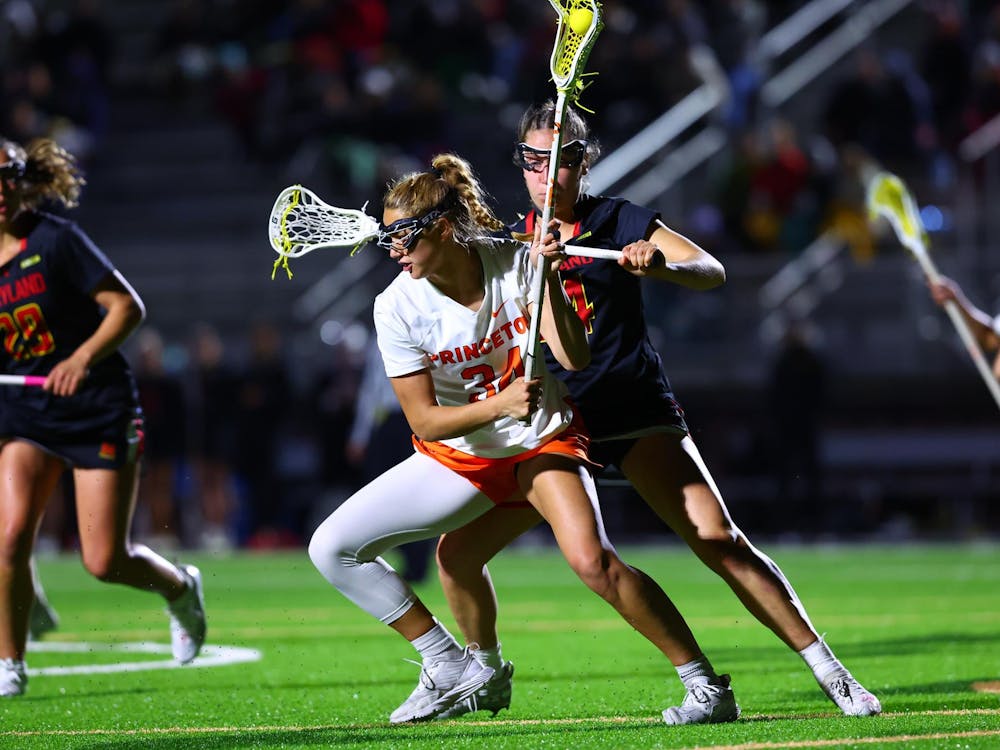President and CEO of the International Rescue Committee David Miliband travels all over the world to support refugees. Yet he started his lecture, “The Global Refugee Crisis and What To Do About It,” by pointing out his connection to the University.
“The International Rescue Committee was founded by Albert Einstein in 1933 in response to Hitler’s regime," he said. “One of the things [Einstein] did was to stay in Princeton and the other was to found the IRC.”
Since its inception 83 years ago, the IRC has grown into one of the world’s largest refugee aid organizations. Miliband “oversees the IRC’s humanitarian relief operations in more than 40 war-affected countries and its refugee resettlement and assistance programs in 26 United States cities,” according to a University press release.
Miliband, addressing his speech to a packed lecture hall in McCosh 10, explained why such breadth is necessary when assisting refugees — their numbers and their plight has grown into a global epidemic, spurred by deep societal changes.
“There is a threat or fundamental change to the architecture and assumptions undergirding international relations through my lifetime,” Miliband said. “I think we’re at a moment that historians will come to consider really crucial, way beyond whether or not there’s a change in these assumptions.”
Global shifts in political trends, Miliband asserted, are the root sources of this pivotal moment.
“The political crisis frames everything, including the refugee crisis, which is a symptom but also, to some extent, a cause of some of the juddering political changes you see in the U.K. and also in the U.S.,” he said.
“This debate, sometimes about populism, about societal divides or restricted democracy, is part of a wide syndrome of fragmentation and upheaval,” he continued. “The Eurasia group has forecast a geopolitical repression with the danger of a geopolitical depression. And I would argue that it’s really the case that globalization over the last decades has been too unequal, too unstable, and too insecure for it to have much good.”
Miliband identified a newly emerging conflict between political and economic goals as the core source of international disruption.
“Politics and economics are indeed tearing each other apart,” he said. “The global economy is boosted by high levels of migration, but local politics, mostly at the request of societies, are being torn apart by debates on immigration. Global economics is stabilized by international economic cooperation and support by nations on sharing, but local politics, on that sharing, is very resistant."
Many politicians are also opposed to international trade, Miliband argued.
Miliband sees the potential end of what he termed a ‘post second-world war era,’ a time period in which Western nations largely collaborated toward common goals.

“This isn’t just about Post-Cold War era, it’s about post-war era,” he said. “The Cold War was fought to break down walls; the West after World War II stood for a declaration not of independence but of interdependence. The West associated universal values, not just Western ones, and argued that injustice or oppression anywhere was a threat to justice and freedom everywhere. And it’s those assumptions that I would argue are now under question.”
All of these issues, Miliband said, are directly and negatively affecting refugees.
“Refugees are caught between the forces of global interconnectedness and political contraction,” he said.
Miliband spent the rest of the lecture speaking about the five major points that he believes characterize the refugee crisis.
“First, that the mismatch between need and provision for refugees and displaced people has never been greater,” he said. “Let me start with the scale of the crisis.”
There are more than 65 million refugees today; they are forced migrants, Miliband said, not economic migrants seeking better opportunities. Few are willing or even able to return to their homes, which are ravaged by war or instability. Many are internal refugees — people who are displaced from their homes but remain within their country’s borders.
“The word crisis, I’m sure, is overused, but my goodness this is a crisis,” he said.
Miliband than cautioned against the proliferation of myths revolving refugees and urged the audience to focus on the facts.
“We need to break free of fictions that undermine the situation,” he said, citing a sheet listing facts about refugees as opposed to common conceptions about them, that had been taken off of the U.S. State Department’s website.
“Frankly, the attack on facts deserves a Princeton lecture series all to its own,” Miliband said to applause from the audience.
“It’s a fiction that wealthy countries like the United States host the majority of refugees, they don’t,” he added.
Miliband also argued that Western imperialism shouldn’t be entirely blamed for the roots of the crisis.
Third, he said, refugee resettlement is part of the solution. He described how Turkey had built refugee camps meant to hold 217,000 migrants; there are now over 2 million registered Syrian refugees living in Turkey, with many more likely undocumented. This case, according to Miliband, demonstrates the importance of integrating refugees into cities and communities.
He also advocated for greater reform in the economics of refugee aid — not just increased contributions — but a more effective allocation of resources.
“We need to reform humanitarian need and build a model of economic, not just social support,” he said. “More money alone is not enough to solve the crisis. We have to think about the kind of help we’re providing, where we’re providing it, and how.”
He cited Jordan as an example of a nation working hard to offer more support from refugees but also in need of support from the World Bank. He also described Nigeria as an excellent example of refugee support and integration.
“In Nigeria, fewer than one percent of refugees are completely independent on national aid,” he said. “Every refugee who arrives gets a plot of land, the right to a job, and other support to make a new life.”
Finally, Miliband argued that Western countries’ treatment of refugees will dictate their social values in the years to come.
“If we do these things I argue, we will express the important values of our own societies,” he said. “The work of rescue is not only about ‘them,’ it’s also about ‘us.’”
In the question-and-answer session following the lecture, an audience member asked about the United State’s security concerns regarding refugees from countries too unstable to provide documentation papers.
“We’ve got to hold to the facts,” Miliband responded. “It’s perfectly legitimate to ask about security.”
“People are responsible for their own papers. The burden of proof is on the refugee, not the U.S.; it’s not the refugee that chooses to live in U.S., it’s the U.S. that makes sure they are secure.”
“If you want to come cause trouble in the United States, you don’t come as a refugee. It’s far too difficult,” he joked. “I don’t want to advertise other methods.”
A University graduate student asked about the change of rhetoric that he believes has accompanied the rise of populism.
“Immigration and refugees are tied together,” Miliband said, stating that political rhetoric tends to address both as one issue. “Confusion of the two is very difficult.”
A graduate student asked about the difficulty of balancing the need for programs with short-term effects and the need for long-term investment.
“It’s a great question, because longitudinal effects of investment are hard to get it in the short-term,” Miliband responded.
“You’ve got to be willing to [establish programs that last] for longer than three to five months,” he added.
Another student asked if the data has so far shown whether the cause of displacement is a significant differentiator in the needs of refugees.
“It’s a great question. And the thing about great questions is I don’t know the answer,” Miliband responded to laughter in the audience.
He added that extreme weather events change the needs of refugees because they are much more likely to eventually return to their home countries.
Related to this response, a University student taking a class on the environment asked if there was a climate change component to the refugee crisis.
“Climate change and the refugee crisis must be considered separately," Miliband said.
Another University student asked Miliband what he would be doing if he were a 19-year-old at Princeton.
“Don’t start thinking first about how to uproot your life. Don’t resign from Princeton, finish your studies, get good grades,” he joked. “But while you’re doing that engage locally. We have an office in Elizabethtown, New Jersey that resettles refugees.”
“Be a citizen who takes his citizenship seriously locally,” he added.
Before heading the IRC, Miliband served as the United Kingdom’s 74th Secretary of State for Foreign Affairs and represented the Labour Party in Parliament from 2001 to 2013.
Miliband’s political career is what attracted Jonny Hopcroft ’20, who is from the United Kingdom, to the lecture.
“I was struck by how confident a public speaker he is and how good of a leader he would be,” Hopcroft said, adding that he was disappointed when Miliband lost the 2010 Labour leadership election to his brother, Ed Miliband, who was later defeated in the general election.
“It makes me frustrated. He could have been our [Canadian Prime Minister] Justin Trudeau,” he said. “He would stand up for our values.”
“[Miliband’s] accomplishments have earned him a reputation, in former President Bill Clinton's words, as “one of the ablest, most creative public servants of our time,” and as an effective and passionate advocate for the world's uprooted and poor people. As the son of refugees — Miliband’s parents fled from continental Europe to Britain during World War II and its aftermath — he brings a personal commitment to the IRC's work,” a University press release said.
The lecture, sponsored by the Edge Lecture Series, was held in McCosh 10 at 6:00 p.m. on March 1.








